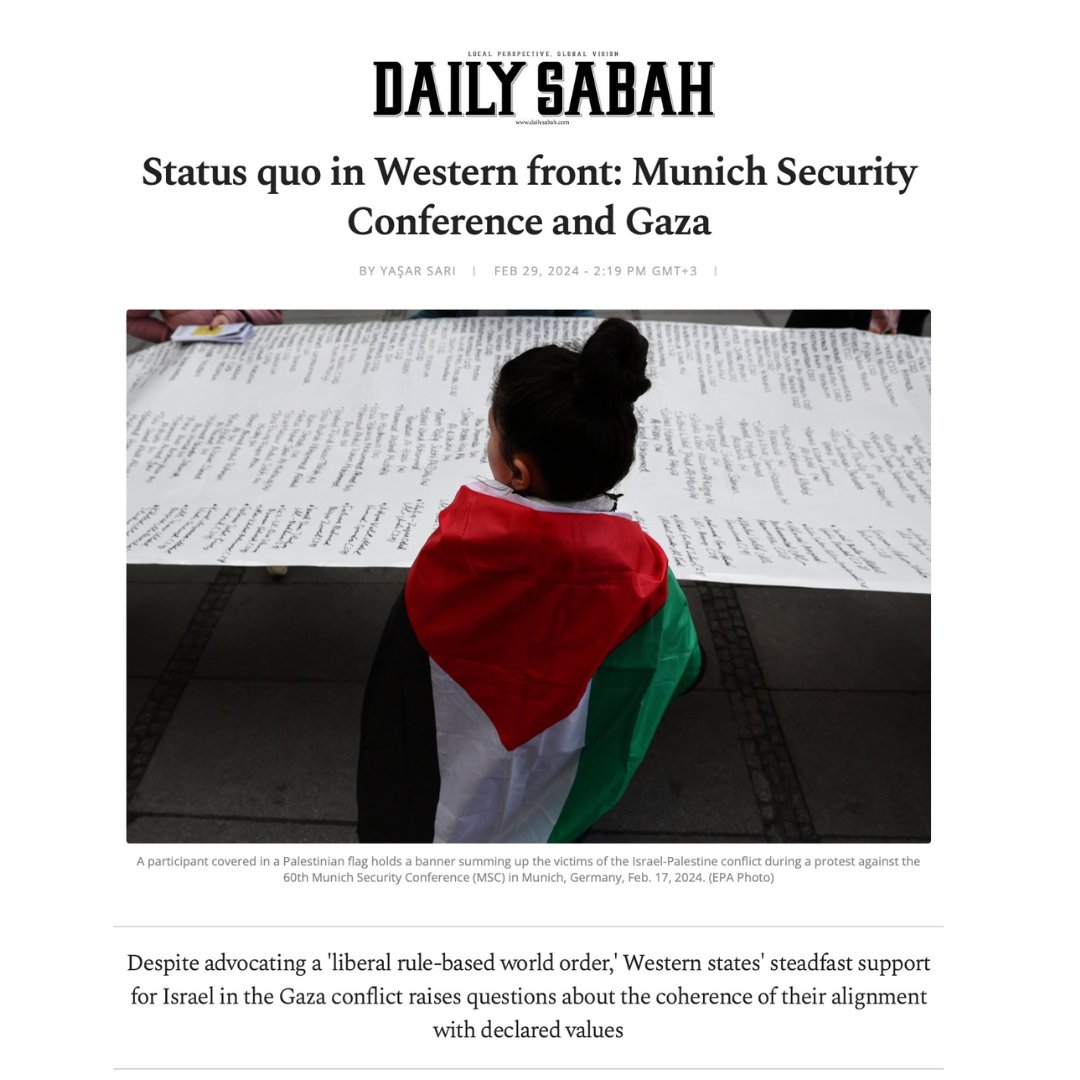


The Munich Security Conference is a pivotal forum where key international actors convene to deliberate on global security matters. Analogous to the World Economic Forum in Davos, this conference provides a venue where major powers can assess security challenges while advancing their respective interests within the international system.
Prior to the conference, a comprehensive analysis of the prevailing global security landscape is conducted. The recently published report titled "Lose-Lose?" preceding February's conference underscores a prevailing sense of pessimism among international actors, indicating challenges and their concerns in addressing these volatile contemporary issues.
Despite advocating for a "liberal rule-based world order," certain discrepancies arise in the actions of these actors, particularly concerning the situation in Gaza. Leading Western states, especially the United States, the United Kingdom and Germany, continue to voice their unwavering support for Israel contrary to their own declared human values. While espousing democratic values and human rights principles, Western political regimes have faced criticism for their perceived complicity in the Israeli's actions in Gaza. Restrictions on public demonstrations supporting Gaza further highlight this contradiction, raising questions about the consistency of Western policies with their stated values. The ironic part is that those who, on the one hand, emphasize human rights and democratic values while also judging and classifying other societies and countries according to these values are playing the three monkeys vis-a-vis Israel's oppression. Then, in the conference, hypocritically, they discuss and ask each other why the current international system is breaking down. Why have Western countries lost their moral compass?
Recent events require a reassessment of the universal applicability and validity of Western norms and values, particularly within contexts that challenge their own strategic interests. Selective language was used in characterizing the Gaza conflict within the conference report. It was coupled with the omission of significant events such as the International Court of Justice (ICJ) hearing and its preliminary decision on Israel's massacre in Gaza, Israel's horrendous assault on Gaza's people, biased narratives and the framing of human-made humanitarian disasters as complex geopolitical issues.
Furthermore, in the report, the contributors of the report used selective and biased wordings on what is happening in Gaza, such as "war between Hamas and Israel," "immense suffering in Israel," "Israel conducts operations in Gaza" and "civilians as human shields." They totally ignore the indiscriminative bombing of Israel targeting innocent civilians, not to mention the intentional massacring of children and women and the total destruction of civilian infrastructure, such as hospitals, schools, mosques, churches and residential buildings.
Again, while acknowledging regional dynamics in the Middle East, the report overlooks the role of Western powers in exacerbating conflicts, such as those in Ukraine and Gaza. The report also expresses the main problem in the Middle East as it "began shifting zero-sum mindsets among regional powers." It ignores the responsibility for the bloody developments in Ukraine and Gaza, which could have been prevented from the beginning and stopped in the process if it were not for the "zero-sum mindsets" of the major Western powers, or more precisely, the Western policymakers. Western policymakers contribute to destabilizing the international system they seek to preserve by perpetuating zero-sum mentalities and pursuing self-serving agendas. They both praise and want to keep it and also cry for the collapse of the international system from which they have benefited for a long time.
The phrase popularized by Henry Kissinger, "If you are not at the table in the international system, you are on the menu," echoed by U.S. Secretary of State Antony Blinken at the Munich Security Conference, indicates that Blinken sees the world through a zero-sum game mentality and a worldview in which the strong prey on the weak. Blinken's invocation of Kissinger's adage at the Conference reflects a persistent worldview characterized by asymmetric power relations and hierarchical structures. This mentality contradicts the ideals of a truly democratic and inclusive international order, emphasizing the need for a paradigm shift in global governance. It shows that U.S. decision-makers still have the perception of a world in which they rule the world and others are subordinate to them.
Despite the breadth of global security concerns, the Munich Security Conference often prioritizes the agendas of dominant powers, for example, the situation in Ukraine or the measures to be taken against Russia and China, marginalizing humanitarian crises such as the situation in Gaza. Moreover, no participants were allowed from Russia except Yulia Navalnaya, the wife of Alexei Navalny, who lost his life under suspicious circumstances. However, Israeli President Isaac Herzog, who has the blood of innocent Palestinian women and children in Gaza on his hands, was allowed to make a speech. The selective participation of certain actors further deepens the asymmetrical nature of international discourse, highlighting systemic inequalities in global decision-making processes, which President Recep Tayyip Erdoğan has derided with the phrase "the world is bigger than five."
In conclusion, while the Munich Security Conference remains a crucial platform for addressing global security challenges, its effectiveness is contingent upon a more inclusive and balanced approach that prioritizes humanitarian concerns alongside geopolitical interests. Addressing these inherent biases is essential for fostering genuine cooperation and stability in an increasingly interconnected world. In short, Western decision-makers have once again shown their hypocrisy. Just like they did before, in this respect, nothing has changed on the Western front.